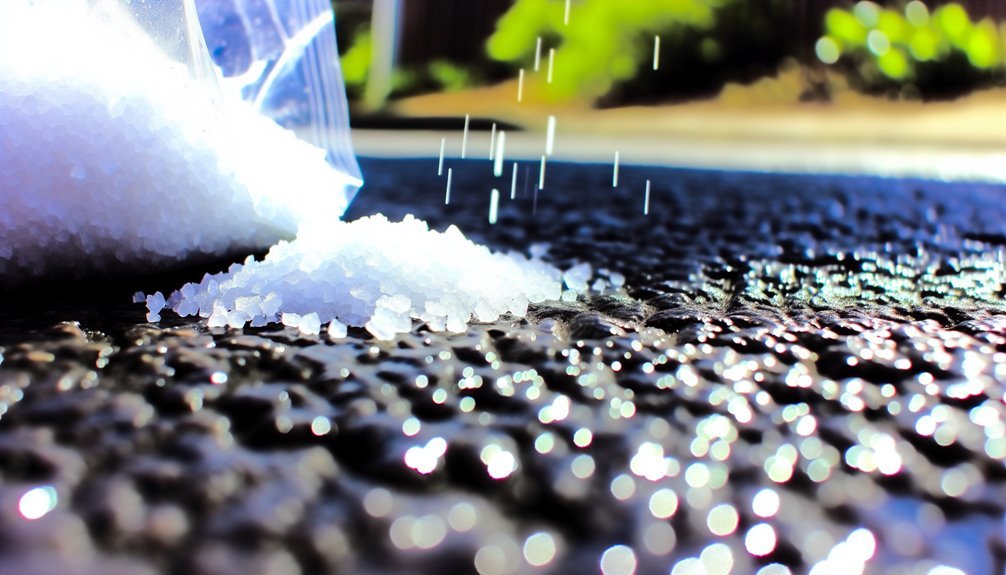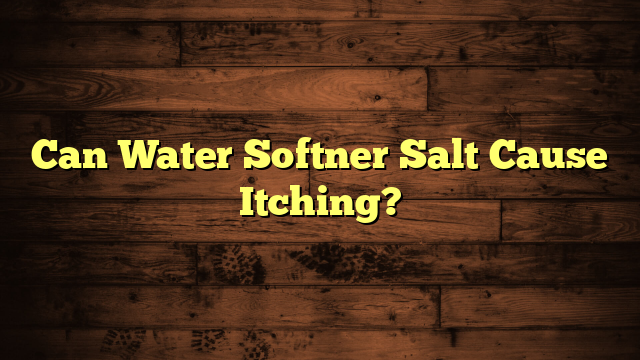Disposing Water Softner Salt Water to Street
Did you know that improper disposal of water softener salt water can introduce up to 25,000 milligrams of sodium per liter into local waterways? This not only threatens aquatic ecosystems but also raises serious concerns about soil quality and plant life. As you consider the implications of this practice, it is crucial to explore the broader impact on both the environment and community health. What are the alternatives that can protect our natural resources while still maintaining the effectiveness of water softeners?
Key Takeaways
- Disposing of water softener salt water on the street can lead to soil salinization and harm local plants and wildlife.
- High sodium levels from brine can contaminate drinking water sources, posing health risks to the community.
- Many local regulations prohibit disposing of brine in public areas to protect the environment and avoid fines.
- Consider eco-friendly disposal alternatives, such as local treatment facilities or reusing brine for de-icing, to minimize environmental impact.
- Educating the community about proper disposal methods fosters responsible practices and enhances environmental sustainability.
Environmental Impact of Brine Disposal
When you dispose of brine from your water softener, it's vital to take into account the environmental impact it can have. Brine composition typically includes high levels of salt, along with other minerals and chemicals that can harm local ecosystems.
When you choose a disposal method, be mindful of how these components interact with soil and water sources. Improper disposal methods, like dumping brine down storm drains or onto land, can lead to soil salinization and contaminate waterways. This can impact plant life, aquatic habitats, and even drinking water supplies.
Instead, consider more responsible alternatives. One option is to find a local facility that accepts brine for proper treatment and disposal.
Another method involves reusing the brine in a way that minimizes its environmental footprint, such as using it for ice control on driveways in winter.
Always research and understand the consequences of your chosen disposal method. By doing so, you not only protect the environment but also contribute to a sustainable future.
Making informed choices about brine disposal is an important step in being a responsible homeowner and steward of the planet.
Legal Regulations on Salt Water Disposal
Legal regulations governing salt water disposal vary by location, but they often aim to protect the environment and public health. Each state or municipality has specific regulatory frameworks and compliance standards that dictate how you can dispose of salt water from water softeners. Ignoring these regulations can lead to severe penalties, including fines and potential liability for environmental damage.
Consider the implications of improper disposal:
- Contaminated local water supplies affecting drinking water safety
- Harm to wildlife that depends on clean water for survival
- Negative impacts on your community's health and well-being
- Legal repercussions that could strain your finances
It's essential to familiarize yourself with the regulations in your area. Many local governments provide guidelines on how to dispose of brine safely and responsibly.
Engaging with your local authorities can clarify compliance standards and provide resources for proper disposal methods. By following these regulations, you contribute to a healthier environment and safeguard public health, ensuring that future generations can enjoy clean water.
Always prioritize responsible practices when managing salt water disposal; it's not just about compliance, it's about community care.
Effects on Local Ecosystems
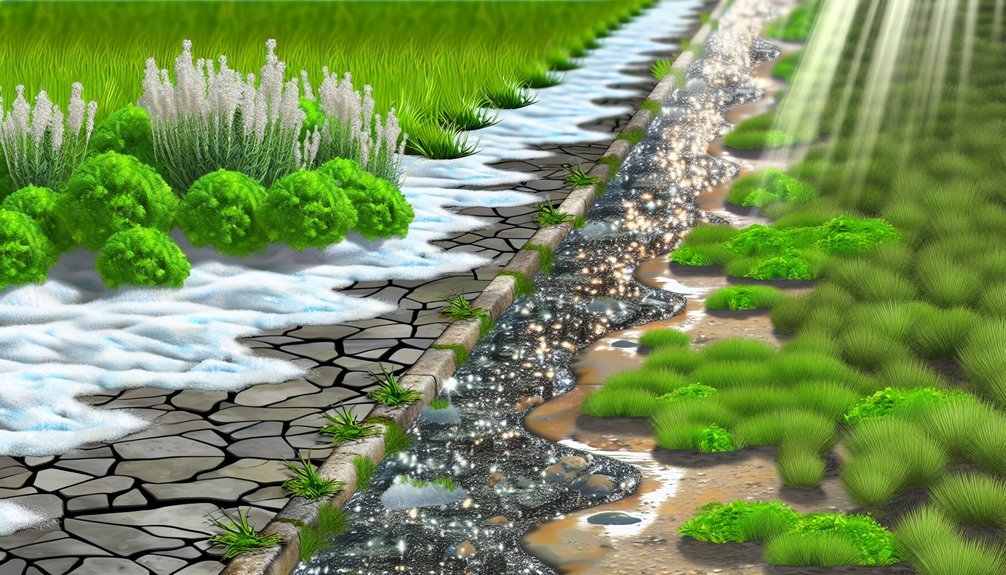
Improper disposal of water softener salt water can have significant consequences for local ecosystems. When you dump this brine onto the street, it may flow into nearby water bodies, leading to salt toxicity. Elevated salt levels in soil and water can disrupt local flora and fauna, harming plants and aquatic life.
Consider the following impacts of salt water disposal:
| Impact | Description |
|---|---|
| Salt Toxicity | High salt levels can kill or stress plants, reducing biodiversity. |
| Ecosystem Disruption | Aquatic habitats suffer as fish and other wildlife struggle to survive. |
| Soil Health | Increased salinity can degrade soil quality, affecting agriculture. |
| Water Quality | Elevated salinity levels can lead to harmful algal blooms. |
Salt toxicity can change the composition of ecosystems, making it harder for native species to thrive. You might not realize it, but these small actions can ripple throughout the environment, causing long-term harm. By disposing of salt water responsibly, you help protect local ecosystems, preserving the delicate balance that sustains wildlife and plant life in your area.
Water Quality Concerns
Disposing of water softener salt water can seriously compromise water quality in your area. When you pour this brine down the street, you're introducing high levels of sodium and chloride into the environment, which can have far-reaching effects on local water sources.
Consider the potential consequences:
- Increased salinity can harm aquatic life, disrupting ecosystems.
- Contaminated drinking water sources could lead to health risks for you and your community.
- Algal blooms may flourish due to nutrient imbalances, further degrading water quality.
- Soil toxicity can rise, affecting agricultural productivity and safety.
Water testing often reveals the alarming presence of pollutants from various sources, including improperly disposed brine.
It's crucial to recognize that your actions can contribute to these pollution sources, impacting not just the environment but also human health.
The salty runoff can seep into groundwater, making it unsuitable for drinking or irrigation.
Eco-Friendly Disposal Alternatives
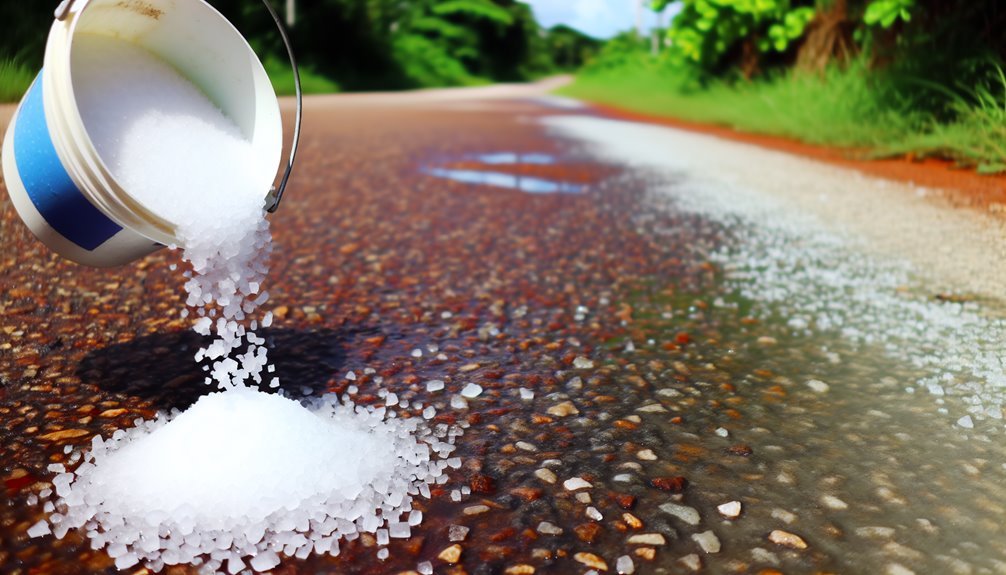
When it comes to disposing of water softener salt water, considering eco-friendly alternatives is vital.
You have options that minimize environmental impact, but it's also important to stay informed about local regulations.
Let's explore some effective methods that can help you responsibly manage this waste while protecting our planet.
Environmental Impact Considerations
Considering the environmental impact of water softener salt water is essential for responsible disposal. You mightn't realize it, but dumping salt water into storm drains or streets can harm local ecosystems. This practice raises serious environmental ethics concerns, as it can lead to increased salinity in waterways, affecting aquatic life and drinking water sources.
Here are some emotional considerations to keep in mind:
- Harm to aquatic habitats: Local fish and plants struggle to survive in salty environments.
- Contaminated groundwater: Excess salt can seep into our water supply, affecting everyone.
- Long-term ecological damage: Once the harm is done, it can take years to recover.
- Community responsibility: Your choices impact your neighborhood's health and beauty.
Alternative Disposal Methods
Finding eco-friendly ways to dispose of water softener salt water can greatly reduce the negative impact on the environment. One excellent alternative is to evaluate salt alternatives, such as potassium chloride. This option not only softens your water but also minimizes harmful effects on local waterways.
If you choose to stick with sodium-based softeners, explore proper disposal methods that prevent contamination. Instead of dumping the salt water down the drain, think about using it for other purposes. For instance, you can use diluted salt water to de-ice driveways in winter. This way, you're repurposing the brine rather than discarding it irresponsibly.
Another idea is to collect the salt water and use it in your garden, but be cautious with salt-sensitive plants. You might also want to contact local water treatment facilities to ask about disposal programs they may have in place. They often have eco-friendly solutions that align with environmental guidelines.
Local Regulations Awareness
It's crucial to be aware of local regulations regarding the disposal of water softener salt water, as these guidelines can vary considerably from one area to another. Ignoring local laws not only risks potential fines but can also harm the environment.
To guarantee regulatory compliance, take the time to research your community's rules and best practices.
Consider these eco-friendly alternatives to improper disposal:
- Protect your local water sources from contamination.
- Contribute to the health of your community.
- Avoid costly fines and legal troubles.
- Promote sustainability for future generations.
By understanding and following the local regulations, you can make a positive impact. Many areas have specific disposal methods that minimize environmental harm, such as using designated waste disposal facilities or recycling programs.
If you're unsure, contacting your local waste management authority can provide clarity.
Taking these steps isn't just about compliance; it's about being a responsible community member. When you dispose of water softener salt water properly, you help preserve local ecosystems and contribute to a healthier environment for everyone.
Always prioritize local laws to guarantee you're doing your part in maintaining a sustainable and safe community.
Best Practices for Salt Management
Managing salt in your water softener system is essential for ideal performance and longevity. To guarantee you're using salt efficiently, consider implementing salt recycling practices. This means reusing leftover salt when possible; for example, if you have unused salt from an old bag, don't toss it away. Instead, keep it for future use.
Another best practice is to monitor your salt levels regularly. By checking the salt level in your brine tank often, you can prevent your system from running low, which can lead to inefficiencies and increased salt usage.
Furthermore, be mindful of the type of salt you're using. Opt for high-purity salts, as they dissolve better and require less frequent replacement, aligning with sustainable practices.
You should also aim to minimize water waste by optimizing your regeneration cycles. Adjust the settings according to your household's water usage patterns. This not only conserves salt but also helps in reducing the saltwater discharge into the environment.
Community Awareness and Education
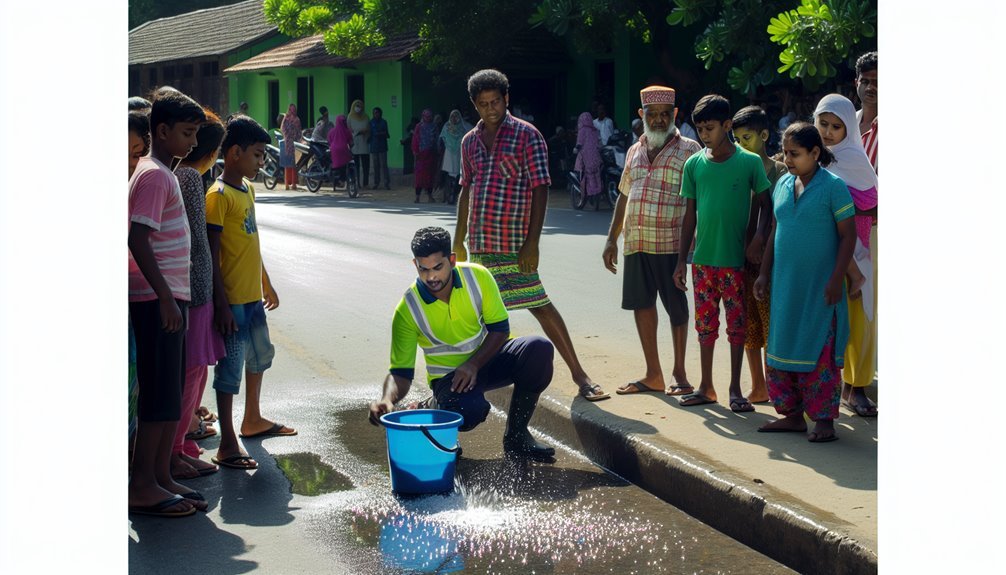
Awareness and education in the community play a significant role in promoting responsible salt management practices. When you understand the impact of improperly disposed salt water, you become an advocate for change.
Community involvement is essential, and educational programs can empower you and your neighbors to make informed decisions about salt disposal.
Consider the following points that highlight the importance of awareness:
- Improper disposal can harm local water systems and wildlife.
- Educated communities can reduce overall salt use, benefiting the environment.
- Engaging in discussions about salt management fosters a sense of community responsibility.
- Knowledgeable citizens can inspire others to adopt better practices.
Frequently Asked Questions
Can I Use Brine for Other Household Purposes?
You can definitely find alternative applications for brine. Consider using it for de-icing sidewalks in winter or as a fertilizer for certain plants. Just guarantee it's suitable for the specific purpose you have in mind.
How Often Should I Dispose of Salt Water?
When it comes to salt disposal frequency, you should aim to dispose of it every 6-8 weeks. Keeping an eye on the environmental impact is key, so don't let it pile up unnecessarily.
What Types of Salt Are Safe for Disposal?
You should consider using eco-friendly salts like potassium chloride or magnesium chloride. These sodium chloride alternatives are safer for disposal and less harmful to the environment, ensuring you make a more sustainable choice for your needs.
Are There Any Health Risks From Brine Exposure?
When you consider brine exposure, you should know about brine toxicity, environmental impact, and potential health risks. Prolonged contact can cause skin irritation, respiratory issues, and harm local ecosystems, so avoid unnecessary exposure.
Can Brine Affect Road Safety During Winter?
Brine can negatively impact road safety during winter. It causes corrosion on vehicles and infrastructure, increasing maintenance costs. Furthermore, its environmental impact raises concerns about local ecosystems, so consider alternatives for winter road treatment.
Conclusion
To sum up, disposing of water softener salt water onto the street isn't just a bad idea; it's like throwing a party in a library—loud and disruptive to the ecosystem. To protect our water quality and local wildlife, it's crucial to follow proper disposal methods. Remember, every little action counts. By choosing eco-friendly alternatives and staying informed, you can help keep our environment healthy and thriving for generations to come. Let's act responsibly—for our planet's sake!

